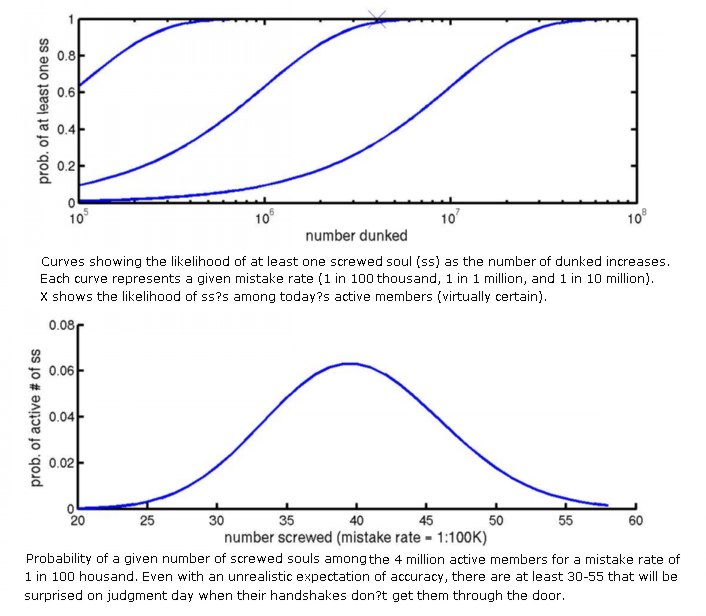Priesthood authority not as concrete as we thought
Posted: Tue Jan 27, 2009 4:31 am
Just for funsies I'm posting this from another thread
Sethbag wrote:cinepro wrote:A similar question was recently discussed over at MAD. Turns out, when the chips are down, "authority" may not be as concrete as we previously thought.
Wow, there's a real shocker.
NorthboundZax wrote:I used to think about that as a missionary. If "Amen to the priesthood of that man" happened, but bishops and whoever didn't know/care, where do such perfomed ordinances by this person land?
A few years ago, I wrote a version of the following:NBZ wrote:The Kolobian bureaucracy will be excluding a number of people who thought that they had checked off all the required boxes to enter the Celestial Kingdom, as many ordinances require exact wordings and actions to be valid. Using probability analysis we can estimate the number of erroneously performed ordinances to find the number of people that will be doomed to lower kingdoms than they otherwise would have achieved.
For example, baptism can be checked off in heaven only if the prayer is recited verbatim with the correct hand gesture and the baptizee is entirely immersed in the water at some instant in time shortly thereafter (exposed toes, knuckles, or incompletely immersed hair requires a do-over). Two witnesses are required at each baptism to verify its suitability. Confirmation, initiatory, and endowment also require exact standards, but are trickier and not always as thoroughly policed as baptism. So these ordinances likely have been botched even more often than for baptisms.
It is not uncommon for one or both of the witnesses to ask that the baptism be redone for the one or more of the following reasons (but not limited to): verbal deviation from the written standard, arm not fully to the square or fingers extended correctly, or the bapitzee not fully immersed. A little probability analysis can be illuminating regarding how reliable this process is. Whether or not false negatives are theologically significant or not (causing a properly performed ordinance to be re-performed) should probably also be explored as there are undoubtedly even more of those.
Suppose a slightly erratic priesthood holder performs baptisms correctly only 75% of the time, but has two witnesses that are each correct 90% of the time (wrong 10% of the time). With two witnesses the rate of false positives will be about 1 in 400 ((1-0.9) ´ (1-0.9) ´ (1-0.75)). Estimating from the number of baptisms attended by the author in the last decade and a half (~40) that needed to be re-performed (~4-7) I would guess that 80-90% accuracy for those doing the baptizing. For the sake of argument, suppose 95% accuracy on their behalf. For the witnesses, 98% accuracy seems sufficiently conservative. Assuming that witness fallibility is independent is a best-case scenario, although not entirely realistic (a mistake may be missed by both witnesses for the same reason such as an inopportune sneeze). These values suggest false positives with the chance of 1 in 50 thousand. For matlab reasons, let’s use an even more conservative estimate of 1 in 100 thousand.
The probability, f, of having at least one false positive (unnoticed mistake) in a population of size s is given by f = 1 - (1-p)^s, where p is the probability of a mistake not being noticed (e.g., 1/100,000). f ranges from 0 (impossible) to 1 (certain). As f becomes larger, the likelihood that more than one also increases. The probability, q (again ranging from 0 to 1), that there will be any particular number, g (0, 1, 2, …), of false positives in a given population is found by
q = k * (1-p)^(s-g) * p^g,
where
k = s!/(g!(s-g)!)
and ! means factorial.
With a current pool of 12 million members, f > 0.999999999999, meaning that there is a greater than 99.9999999999% chance that one or more souls are eternally oopsed because their ordinance was unknowingly botched. Just among the 4 million, or so, actually striving for the CK, there is probably between 30-50 oopsed souls. With a quick extrapolation to the roughly 20-50 million baptisms occurring in the church since 1830 (not counting all the proxy work), there is a greater probability of someone winning the Missouri Mega Millions Powerball Lottery twice in a row than in having everyone’s ordinances who wanted them done to the bureaucratic standards of Kolob.
These problems could actually be even worse than shown above. What if an eternally oopsed person baptizes someone else? Since the baptizer couldn’t have the proper authority, that baptizee is also oopsed and the witnesses definitely aren’t going to catch it. Since Joseph and Oliver didn’t have any witnesses to make sure they did it right, there is a good case that we are all doomed to lesser kingdoms anyway, even if Mormon mythology had any truth to it.
Scottie wrote:That was great, NBZ!!
However, you forgot the LDS mantra... it will all work out in the end.
